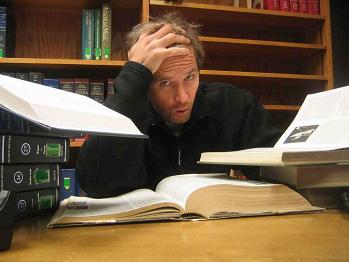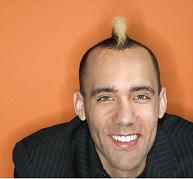Help – I Need Your Study Ideas
Posted by spritzophrenia on February 16, 2011
So I’ve enrolled for my post-Grad course in Sociology. Lectures start in ten days, and I have to come up with a thesis topic pronto. I want to study something interesting, and perhaps controversial (because that is more motivating and publishable). I was hoping to study something relating to religion, and the topics I had were things like:
|
* Gay and Lesbian Perceptions of God Unfortunately I’ve been told that they can’t supervise me for sociology of religion. So now I have to find something else I can get passionate about. Maybe you can suggest some ideas? |

|
Other areas I’ve come up with that I might be able to get interested in:
* Music? (Usually studied under “popular culture”)
eg “The ethnicity of heavy metal fans”
* Zombies (“popular culture”)
* Sociology of Food?
* Power – Foucault. The power of … academics?
* Drug use among working professionals
* Social Media – Facebook, Twitter etc
Think of a group in society and something you’d like to know about them.
Things Sociologists are interested in: Age, Gender, Sexuality, Ethnicity, Class, Status, Deviance, Family, Ideology, Postmodernism, Power, Globalism.
Institutions Sociologists have studied include: Law, Science, Health, Internet, The Military, Education, Media. For more ideas of topics see http://en.wikipedia.org/wiki/Sociology
Ideally it would be something I can study by surveying and interviewing people.
Are you able to suggest any controversial/interesting topics?
Thanks!
27 Responses to “Help – I Need Your Study Ideas”
Sorry, the comment form is closed at this time.

Iain said
Social media is a good thing to use, even if your topic isn’t ON social media itself. I heard one researcher note that twitter has provided an unprecedented way to get easy access to survey participants on issues of opinion. Social media changes the face of research. Perhaps you could even take a meta-level approach to that and compare social network information networks to non-internet-based information networks and social groups and compare their impact on society.
spritzophrenia said
Yes! It will provide a much easier way to contact specific groups that I don’t personally know.
Lydia said
How about studying the difference between what people _say_ they believe about race/gender/sexuality and how they actually behave in their daily lives.
For example, hetero couples who believe that they are egalitarian but divide home responsibilities along more-or-less traditional gender boundaries that place most to all of homemaking on the woman.
Or people who say that they’re comfortable with any race/culture/religion yet consistently date and befriend only people from very similar backgrounds.
I don’t know if it has been done before but its something I’ve really been pondering recently.
Do people know they’re doing this? How does it influence how they treat others? How do they react when they’re confronted with inconsistencies between what they say and what actually happens?
Iain said
This is more a social psychological study, but people’s genuine racial attitudes show up quite nicely using Implicit Association Tests. People can SAY one thing but then have their underlying biases show up in the test.
However, I’d be wary about condemning people with such unconscious biases. For example, I tend to see myself as fairly fair and non-racist, although I would put money on the fact that I have some racist tendencies under the cognitive microscope. Despite those biases, I try to rationally push through in my action and speech into more fair and balanced behaviour. It is interesting to note that e.g. blacks have been shown to have anti-black racism on IATs which is presumably a function of the racism inherent in their social environment.
So I’d be careful before jumping to too many conclusions. Sometimes what people say matters more than what goes on in the hidden recesses of their mind, even if it takes them longer (cognitively) in any given situation to overcome their personal biases.
As you can see, this is a fairly interesting area of research. Lots of thoughts popping up here!
spritzophrenia said
“So I’d be careful before jumping to too many conclusions.”
This is exactly the problem doing social research. You have to design it very carefully, because there are so many other factors that have to be ruled out. “Proving” something is very difficult. But I love the challenge!
Lydia said
That is so interesting, Iain!
Do you have any book or blog/website recommendations on this topic?
Iain said
Sure, if you have ten minutes to spare, you can take a gender and racial equality IAT yourself!
http://www.understandingprejudice.org/iat/
Iain said
Here’s more research you can look at and take part in, “Project Implicit”, by Harvard, Virginia U, and Washington U.
https://implicit.harvard.edu/implicit/research/
Lydia said
Awesome, thanks.
spritzophrenia said
Race (and probably sexuality) has been studied a lot in sociology, so there are probably some studies on this. I can’t link you to any off the top of my head, but variations on this theme are indeed interesting. Thanks!
spritzophrenia said
I’m still kinda hoping I can twist a soc. of religion aspect into it. It’s just a matter of reading the important stuff in that area, which I can do no problem.
Iain said
Easy. Pick a religious subgroup, or pick two, and examine their social attitudes to a third non-religious issue. That’s sociology being done WITHIN the broader context of religious communities but it is not a study of the religion per se.
spritzophrenia said
That’s a good idea. I used to twist topics to my preferences in my undergrad, surely I can here. eg “Perceptions of Power in Christian Churches”. The topic is about power, but I can also weave sociology of religion into it.
spritzophrenia said
via Cheryl
“In medicine, what factors influence how patients are medicated?
….sexual preference/appearance, etc.
like…if you look like a drug addict do you get treated like one, even on your death bed?
or AIDS patients…
Do they get undermedicated because backward people think they “deserve” to suffer the consequences, etc.”
spritzophrenia said
Via Amy (Twitter)
“Don’t know if this topic is of interest, but what about people choosing not to have kids? Has religious/green aspects.”
Victoria said
Redefining religion as “the good” might keep you closer to your original interests.
* Gay and Lesbian Perceptions of what comprises the good (life)/relational health.
(do gays perceive/pursue good differently?)
* Green Sociology
(do green values create a common understanding of the good life? How much divergence in lifestyle formation among greens: is it unifying in other aspects? Are American greenies the same as….)
* The Good Life According to Academics
Is there a unified concept of good/well-being that goes hand in hand with being an academic? Does it depend upon/transcend one’s culture? (if they don’t believe in the traditional “good”…just what good do they uphold?)
* Catholics and contraception
(how many actually practice the “official method”?) Quantifiable…kind of simple for a thesis?
Iain said
The “good life”, or human flourishing, is something philosophers and ethicists have been studying since the Ancient Greeks. They called it Eudaimonia.
http://en.wikipedia.org/wiki/Eudaimonia
It is definitely a topic that I enjoy as I feel that human flourishing (what it comprises, how to achieve it, its implications for other non-humans and our environment) is one of the central issues in our existence.
I think you will find that our currently major, mainstream religions tend to have a top down view on flourishing, believing that there is only one objectively valid way to gain this good life. Others would disagree. I agree that it could be a good way of sneaking religion in without it being explicitly a “religious” thesis topic.
spritzophrenia said
Good suggestions thanks Victoria. Yeah, I realise some of the topics are not “fully formed” thesis topics. I try not to bog my blog down with academic-speak 😉
Also, this is a small thesis (10,000 words) and is best seen as a preliminary study for a more fully developed one. My Ph.D will be coming at some future point (tremble).
'Seph said
Now that’s an interesting one!
How many people perceive God as sexual? (And yes, that includes heterosexuals). I’ve never really given it alot of thought, but God can’t be sexual, can he/she/it?
Iain said
From a feminist perspective on theology, it is acutely the case that people perceive god as a male (with stereotypical male virtues and tendencies, and showing favour towards men). I can’t imagine that those people would perceive god as gay. I believe in early jewish religion there was actually believed to be a wife of YHWH, making him gendered and heterosexual. I’m not sure where she went to.
spritzophrenia said
Yeah, see all that stuff interests me. After all, if there can be a Black God, or a disabled God (as has been proposed), why not a Gay god?
Also, god as male tends to be more about “masculine” than about sexuality, but all is good stuff to think about.
Iain said
The name of the book slips my mind, but Anthony Flew made a good point during his atheist days. He described the progression of the object of worship: from wood and stone idol of a local god, to tribal god of weather and fate, to cosmos filling god, to utterly transcendent god of the omni- attributes. Why worship something when it can be beaten by something greater? Worship, he says, seeks to raise the object of worship into increasingly higher categories.
I think somewhere along the way god has been neutered, with regards to sexuality. He remains stereotypically male insofar as it suits patriarchal power structures. But I suspect that the imagine unclean nature of sex, birth, and the rest of it has made god lose his sexual aspect. The transcendent god of unchanging perfection is far above any kind of gritty fertility god, isn’t he? At least, I imagine that is what Flew’s point might be if he took his ideas of worship and examine sexuality of the deity.
spritzophrenia said
via Lunagrrrl, Twitter. Thanks 🙂
Women under 25’s attitudes to feminism
Tracy Fitzgerald said
Hierarchies (if that’s the right word/idea) of power (even “spiritual” power) among communities of drug addicts, both among those currently using and those in recovery. I was a meth addict, a “tweaker,” for about 7 years. There was definitely a social hierarchy involved. We had our own leaders, heroes, “cops,” “criminals,” codes, outcasts, enemies, politics, economy, and spiritualities; we even had “countries” of a sort (based on our various drugs of choice). I myself have toyed with the idea of writing a book/article/? someday about that experience from a spiritual POV (I am 9 years clean as of January 4th, 2011); I even have a title: Spirituality Under the Influence. But going back into that world for interviews and the like scares me more than a little. A sociological study of that sub-culture would be very interesting, I think, and would certainly shed some light on our supposedly “clean” culture.
Whatever you decide, I am sure it will be fascinating and very well written – and I’ll want to read it!
spritzophrenia said
Thanks Tracy, that *does* sound like an interesting study. Studies of criminal behaviour are tricky, because I’d have to earn trust etc to get in there, so I don’t think getting the data would be easy. Nevertheless, it does appeal.
And congrats on getting and staying clean 🙂
Should We Tolerate the Intolerant? « Spritzophrenia said
[…] Help – I Need Your Study Ideas […]
A Decade Out « Spritzophrenia said
[…] Help – I Need Your Study Ideas […]